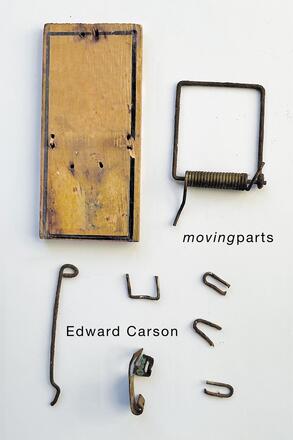
movingparts
Aesop recounts. Sappho whispers. Mischief and insight ensue.
Description
the body / knows what / it truly / wants yet / the mind / wavers all
In Edward Carson’s provocative new work, the poetic moving parts of movingparts confront and breathe new life into what’s true and what’s not in Aesop’s fable "The Fox and the Crow," as well as the shifting, often fragmentary ground between what’s said and what’s not about identity and intimacy in Sappho’s lyrics.
Reflecting the moment-to-moment ways our minds think, these poems take us from a creative process of disconnection and reassembly to a sonic pacing of words arising out of their stillness on the page. A flair for syntactical compression is found throughout, balanced by a capricious yet transforming diction, what John Ashbery described as seeking to stretch “the bond between language and communication.” Calling witness to the narratives of history while pivoting their reach forward to the present, the rhythms, allusions, and resulting outcomes of Carson’s use of language expand both narrative and discovery.
movingparts is brought full circle when an unexpected historical connection between Sappho and Aesop is revealed, hinting that what is true or false in the past or present of our lives can arrive at an intimacy with and illumination of more than we imagine.
Reviews
“Edward Carson’s movingparts weaves in and out of conceptual and material realms, deftly combining crow talk, particle physics, philosophy, and erotica, in the restless search for hints and foreshadowing of paradise. Can we imagine it? Can we get there? This poet wagers his soul on the hope and wonder of it, however far off, however thinly glimpsed – a satisfying tour guide through the conceptual and experiential mazes of the contemporary moment.” Di Brandt, author of The Sweetest Dance on Earth: New and Selected Poems
“Carson has created a beautiful collection of riffs and reveries. movingparts is freeing to read – an effortless display of approaching opaque, distant, and even difficult art with warmth.” Quill & Quire
“In movingparts, Edward Carson has created a rare thing: a book of poetry with dramatic sensibility! His poems each form individual parts of a literally moving narrative that stylistically drift within themselves via parataxis. When the poems eventually meditate upon their own mimesis while still extending the narrative and maintaining dramatic tension, one realizes that this is a special book.” Shane Neilson, author of You May Not Take the Sad and Angry Consolations
“Edward Carson’s movingparts is truly ‘a temple of dapple in a tempest of cause.’ His preoccupation with how our minds work – how they are sparked by desire and emotion – treats us to urgent explorations, like his meditation on Aesop’s fable of the fox and the crow. Carson turns that encounter over and over in his hands to create a brilliant sixteen-faceted jewel, each surface polished by investigation, analysis, and poetic wit. He then presents fourteen sonnets that are ‘detonated’ by lines from other poets, and that meld desire memory anatomy. And, finally, with exquisite control of his craft, Carson walks with Sappho through the terrain of the erotic, discussing ‘the physics of craving.’” Maureen Hynes, author of Sotto Voce
“Read each poem here aloud, they are riffs on myth and fable, they are koans, they are parables. Edward Carson’s poems in movingparts move between what is or has been already said and what lies under the surface to be spoken. These poems are feminist. They are playful. His fox and crow poems, based on Aesop’s fable, are jazzy riffs on wonder. The tight boxes of one section fall away to short lines and then to long-lined couplets, no punctuation so language is fluid as instinct and gesture.” Yvonne Blomer, author of The Last Show on Earth: Poems
“I have a weakness for beast fable, so the first part of movingparts, cunningly engaged with Aesop’s The Fox and the Crow, was a delight to me. Removing the moral, while keeping the story both ethically and existentially charged in a brisk series of prose poems brings this ancient material newly to life. Staying Greek, the latter two parts are engaged with the literary monument that is Sappho, and what she has meant, in particular, to English translators, especially Anne Carson, rather a monument herself. Sappho’s notorious aporia provides Edward Carson with room to speculate both on how difficult it is to translate desire into language, and further, how the act of translation dually reifies and destabilizes a famous poet’s work. His poems warily circle literary monoliths, and from time to time blow right through them, suddenly rendering their substance into breath.” Sarah Tolmie, author of The Art of Dying, Trio, and Check
“Edward Carson’s movingparts engages the primordial subject of deception and truth, ‘mapping it onto’ appearance and reality, so that the either/or can also appear as both/and. For reality appears in appearance, as Carson progressively realizes – makes real – in three suites of poems that nervously explore the ambiguities of language and the unwarranted arrogance of intellect, only to arrive at the healing awareness that the word is at bottom ‘a body / of tectonic / mingle.’ There we can ‘see more where nothing seems to be / each poem setting free all that is missing.’ In one of the volume’s finest poems, set at its centre, entitled – after James Joyce – ‘the bit of seedcake out of my mouth,’ Carson finds that the true word, in the poem and elsewhere, is ‘a sub rosa / of paradise / snared from a wider silence.’ The truthful words have ‘escaped free as a bird’ from the ‘lolling addiction to hoodwink’ in the deserts of theory and politics. And even in that desert itself there are words with substance and more-than-substance, words ready to be ‘startled into / life like / detonations of thought,’ such that we can again ‘begin to / realize what / is happening.’” A.F. Moritz